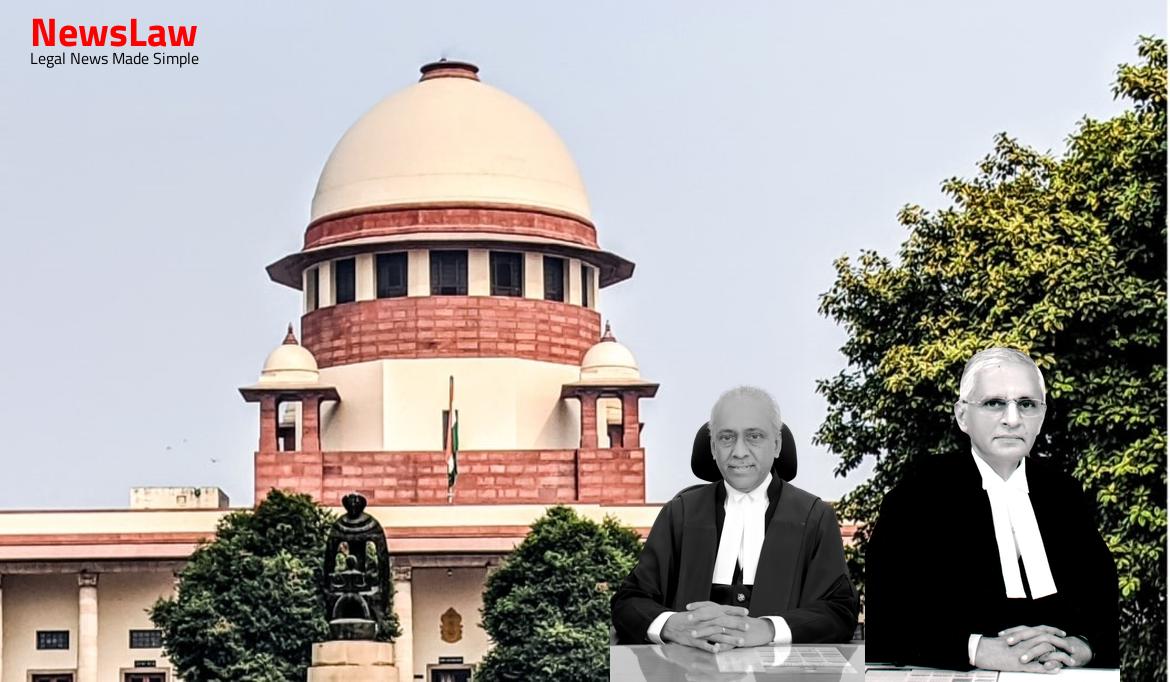Dive into the profound legal analysis provided by the court on the interpretation of the Domestic Violence Act. The judgment delves into the nuanced definitions of ‘domestic relationship’ and ‘shared household’, shedding light on the complexities of the law. Stay tuned to unravel the intricate details and implications of the court’s analysis.
Facts
- The aggrieved person approached the Court seeking protection orders, residence orders, and compensation orders under the Protection of Women from Domestic Violence Act, 2005.
- The aggrieved person had given birth to a daughter on 30 March, 2006, after her husband’s death and had moved to Dehradun to work as a teacher to support herself and her child.
- She claimed that the Stridhana given to her at the time of her wedding was not allowed to be enjoyed and was being used by her in-laws.
- The respondents were accused of mentally torturing the aggrieved person by denying that her child was the daughter of her deceased husband.
- The Court directed all articles of Stridhana listed in the application to be returned to the victim and restrained the respondents from disturbing the victim’s rights to her husband’s property.
- The respondents threatened the aggrieved person against claiming any rights over her husband’s property.
- The Special Judicial Magistrate partially allowed the aggrieved person’s application and ordered the respondents to pay compensation for insulting the victim.
- There were disputes regarding the Maruti car and the land rights of the deceased husband, as well as conflicting claims in legal documents.
- The First Appellate Court set aside the judgment of the Trial Court, establishing that the victim did not leave her matrimonial home of her own will, but due to the conduct of the respondents.
- The victim had not re-married after the death of her husband Kuldeep Tyagi.
- The criminal revision petition was dismissed by the High Court on July 11, 2019, and the judgment of the Vth Additional Sessions Judge, Dehradun, was upheld.
- The High Court found that the Domestic Incident Report is mandatory under Section 12(1) of the D.V. Act, and without evidence of the victim living with the respondents, no domestic violence case could be made out against them.
- The First Appellate Court concluded that the victim never lived in the shared household of the respondents, no domestic relationship existed, and therefore no relief could be granted under the D.V. Act.
- The Trial Court noted that the victim lived with her husband till his death, dismissing the respondents’ claim regarding the paternity of the victim’s daughter.
- The Trial Court observed that the victim left after her husband’s death due to taunts and abuses by the respondents, with no cross-examination by the respondents to dispute this fact.
- The victim was awarded a symbolic amount of Rs. 10,000 for emotional loss suffered.
- The Judicial Magistrate had no jurisdiction to enter the victim’s name in revenue records or grant a residence order until she receives a specific share following a legal partition of property.
- No orders for restoration of possession of Stridhana could be passed in the absence of evidence of delivery to the respondents.
Also Read: Analysis of Tax Exemption for Enemy Properties
Issue
- The aggrieved person had filed an application alleging domestic violence without a report, failing to satisfy Section 12(1) of the D.V. Act.
- The aggrieved person had been residing separately from the respondents since the day of her marriage.
- To establish violence under the D.V. Act, it is necessary for the aggrieved person to share a household with the respondents and have a domestic relationship.
- The Trial Court found the contention on the timing of the aggrieved person’s pregnancy to be unnatural.
Arguments
- The petitioner contended that the failure to consider the Domestic Incident Report would render the Magistrate’s decision null and void.
- The petitioner argued that a domestic relationship is a prerequisite to invoking the provisions of the D.V. Act.
- It was urged that the D.V. Act should be interpreted broadly to provide maximum protection to women.
- The petitioner stressed that the Magistrate should not be barred from granting relief under the D.V. Act due to the absence of a Domestic Incident Report.
- The petitioner emphasized that the period of shared household, even if short, should not be a factor in denying protection under the D.V. Act.
- It was argued that the petitioner’s brief stay at the respondent’s household still qualified as a period of ‘domestic relationship’.
- The petitioner highlighted the importance of the Domestic Incident Report in initiating proceedings under the D.V. Act for granting necessary reliefs.
- The parties’ counsels cited judgments from various courts to support their arguments.
- It was argued that the proceedings under the D.V. Act were initiated with ill-motivated intentions to harass the respondents, especially respondent no. 1 who is an elderly mother-in-law.
- The High Court and First Appellate Court agreed with the respondents and set aside the decision of the Magistrate, ruling that no relief should be granted.
Also Read: SC Clarifies: Choice of Depreciation Method Allowed Until Return Filing
Analysis
- Section 12 of the D.V. Act allows an aggrieved person, Protection Officer, or any other person on behalf of the aggrieved person to seek reliefs under the Act from the Magistrate.
- The term ‘aggrieved person’ refers to any woman in a domestic relationship with the respondent who alleges domestic violence.
- The Magistrate must try to dispose of each application within sixty days from the first hearing.
- Section 17 grants every woman in a domestic relationship the right to reside in a shared household, regardless of legal ownership or interest.
- The Magistrate has the power to grant interim and ex parte orders based on the allegations of domestic violence.
- The Act applies to individuals who have lived in a shared household with those involved in domestic violence.
- The High Courts of Andhra Pradesh, Bombay, Delhi, Gauhati, Himachal Pradesh, Jammu & Kashmir, Karnataka, and Madhya Pradesh are correct in holding that Domestic Incident Report received by the Magistrate from the Protection Officer or service provider is obligatory for the Magistrate to consider before passing any order under the D.V. Act.
- The High Courts mentioned above rejected the argument that a domestic violence case can only be instituted based on the Domestic Incident Report.
- The expression ‘has been’ and ‘have lived’ in the D.V. Act should be interpreted broadly to include even past relationships.
- The objective of the D.V. Act is to immediately provide relief to the aggrieved person, and the Magistrate can take action under Section 12 of the D.V. Act without waiting for the receipt of a Domestic Incident Report.
- The likelihood of women not immediately entering their matrimonial homes after marriage was discussed to emphasize the broad interpretation of the D.V. Act.
- A healthy and correct interpretation of Sections 2(f) and 2(s) of the D.V. Act includes the right to live within the purview of ‘live’ or ‘have at any point of time lived’.
- The judgment emphasizes the right of women in various domestic relationships to reside in a shared household.
- It highlights that the right to reside in a shared household is not dependent on the woman’s actual physical presence.
- The interpretation of ‘domestic relationship’ includes various familial ties like consanguinity, marriage, adoption, and living together in a joint family.
- The judgment clarifies that a woman’s right to reside in a shared household can be enforced even if she is not currently residing in the shared household.
- The proviso in the Act is interpreted to provide exceptions or qualifications rather than negating the main provision.
- The relevance of Domestic Incident Reports and the role of Protection Officers or service providers in the legal process is explained.
- The analysis underscores the inclusive and expansive definition of ‘shared household’ under the Act.
- Various scenarios and examples are discussed to illustrate the application of the provisions in different circumstances.
- The judgment stresses that the Act applies universally to women in India to protect their rights against domestic violence.
- The importance of societal and familial context in understanding the right to reside in a shared household is emphasized.
Case Title: PRABHA TYAGI Vs. KAMLESH DEVI (2022 INSC 563)
Case Number: Crl.A. No.-000511-000511 / 2022



